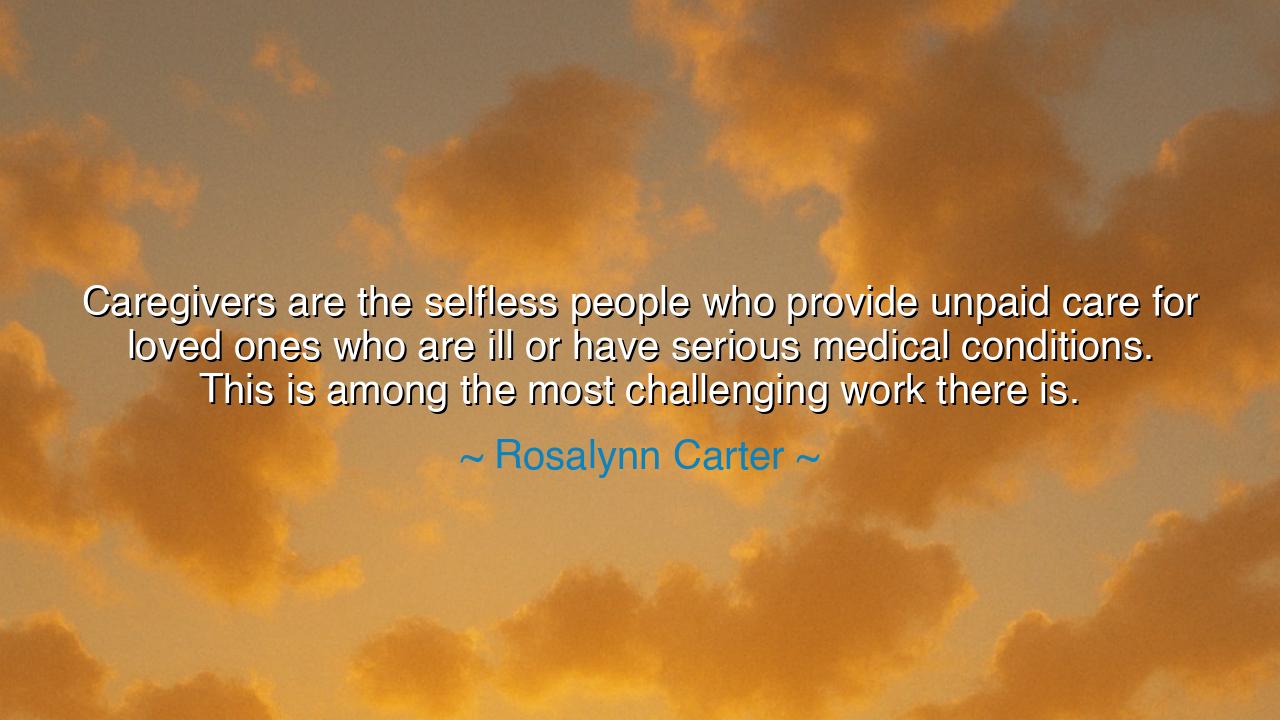
Caregivers are the selfless people who provide unpaid care for
Caregivers are the selfless people who provide unpaid care for loved ones who are ill or have serious medical conditions. This is among the most challenging work there is.






"Caregivers are the selfless people who provide unpaid care for loved ones who are ill or have serious medical conditions. This is among the most challenging work there is," says Rosalynn Carter, and in these words lies a profound reflection on the sacredness and difficulty of caregiving. The caregiver is not merely someone who attends to the physical needs of another; they are the quiet heroes whose work often goes unrecognized, yet whose sacrifices and commitment are essential to the well-being of those in their care. It is a labor of love, of duty, and of immense personal cost, a role that has existed in every culture since the dawn of humanity, yet often goes unnoticed by the wider world.
In ancient times, the role of the caregiver was just as vital, though often unspoken. The Greeks and Romans revered the concept of piety, not just towards the gods, but towards one's family and elders. Homer’s Iliad and Odyssey both illustrate the importance of familial bonds and the responsibilities that come with caring for the sick and the vulnerable. In the ancient world, selflessness was seen as a virtue, and the act of caring for a loved one was a deeply honored duty. Whether tending to an elderly relative or a wounded warrior, the caregiver’s role was not just to ease physical suffering but to provide emotional and spiritual support, offering companionship in times of trial.
The example of Antigone, the heroine from Sophocles' play, offers us a powerful story of devotion and sacrifice. Antigone, defying the king's orders, cares for her brother's body, refusing to let him go unburied. She sacrifices her own safety and well-being out of love and duty to her family. Her actions, though tragic, exemplify the sacred obligation that many caregivers feel: to provide care for those they love, even when the cost is great. Antigone’s story shows that caregiving is not just about physical labor, but a profound moral and spiritual commitment, rooted in a deep understanding of familial and human connection.
In our own time, caregivers face the same challenges, and their role is just as essential. Consider the caregivers who attend to those with Alzheimer’s or terminal illnesses—those who give of their time, energy, and emotional strength without compensation, often at the expense of their own health and well-being. In many ways, the work of caregiving is more challenging than any other because it requires not only physical labor but emotional resilience. The caregiver bears witness to the slow, painful decline of a loved one, all the while maintaining a sense of hope and love. Their sacrifices are a form of quiet heroism, often unrecognized and unappreciated by society, yet essential to the survival and dignity of those they care for.
The lesson from Rosalynn Carter’s words and the examples from the ancients is clear: the work of the caregiver is sacred and should be honored, for it requires not just physical labor, but emotional courage and compassion. To care for another is to give of oneself, to place the needs of another above one’s own desires or comforts. The cost of caregiving is high, but the reward is in the love and human connection that is shared between caregiver and patient. Just as Antigone gave everything for the sake of her family, caregivers today give everything they have for the sake of their loved ones.
In our own lives, we must honor caregivers by recognizing the profound value of their work. We must show gratitude, not just in words, but through action—by offering support, whether emotional, financial, or physical, to those who provide this essential care. Just as the ancients recognized the sacrifice inherent in caregiving, we must honor it in our own time. In doing so, we create a community of care, where the most vulnerable are tended to, and those who offer their love and strength are supported and revered.
So, let us remember the sacredness of caregiving, the selflessness that it requires, and the honor it deserves. Whether through small acts of kindness, offering help to a caregiver, or simply acknowledging their sacrifice, we must do our part to support those who care for others. In this, we reflect the highest virtues of love, duty, and humanity, ensuring that those who give so much to others receive the respect and gratitude they so richly deserve.






AAdministratorAdministrator
Welcome, honored guests. Please leave a comment, we will respond soon